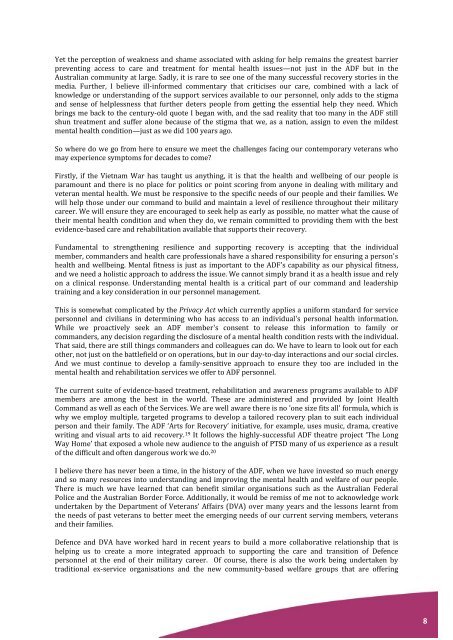Issue No 198 2015
198 2015 Nov_Dec
198 2015 Nov_Dec
You also want an ePaper? Increase the reach of your titles
YUMPU automatically turns print PDFs into web optimized ePapers that Google loves.
Yet the perception of weakness and shame associated with asking for help remains the greatest barrier<br />
preventing access to care and treatment for mental health issues—not just in the ADF but in the<br />
Australian community at large. Sadly, it is rare to see one of the many successful recovery stories in the<br />
media. Further, I believe ill-informed commentary that criticises our care, combined with a lack of<br />
knowledge or understanding of the support services available to our personnel, only adds to the stigma<br />
and sense of helplessness that further deters people from getting the essential help they need. Which<br />
brings me back to the century-old quote I began with, and the sad reality that too many in the ADF still<br />
shun treatment and suffer alone because of the stigma that we, as a nation, assign to even the mildest<br />
mental health condition—just as we did 100 years ago.<br />
So where do we go from here to ensure we meet the challenges facing our contemporary veterans who<br />
may experience symptoms for decades to come?<br />
Firstly, if the Vietnam War has taught us anything, it is that the health and wellbeing of our people is<br />
paramount and there is no place for politics or point scoring from anyone in dealing with military and<br />
veteran mental health. We must be responsive to the specific needs of our people and their families. We<br />
will help those under our command to build and maintain a level of resilience throughout their military<br />
career. We will ensure they are encouraged to seek help as early as possible, no matter what the cause of<br />
their mental health condition and when they do, we remain committed to providing them with the best<br />
evidence-based care and rehabilitation available that supports their recovery.<br />
Fundamental to strengthening resilience and supporting recovery is accepting that the individual<br />
member, commanders and health care professionals have a shared responsibility for ensuring a person's<br />
health and wellbeing. Mental fitness is just as important to the ADF's capability as our physical fitness,<br />
and we need a holistic approach to address the issue. We cannot simply brand it as a health issue and rely<br />
on a clinical response. Understanding mental health is a critical part of our command and leadership<br />
training and a key consideration in our personnel management.<br />
This is somewhat complicated by the Privacy Act which currently applies a uniform standard for service<br />
personnel and civilians in determining who has access to an individual's personal health information.<br />
While we proactively seek an ADF member's consent to release this information to family or<br />
commanders, any decision regarding the disclosure of a mental health condition rests with the individual.<br />
That said, there are still things commanders and colleagues can do. We have to learn to look out for each<br />
other, not just on the battlefield or on operations, but in our day-to-day interactions and our social circles.<br />
And we must continue to develop a family-sensitive approach to ensure they too are included in the<br />
mental health and rehabilitation services we offer to ADF personnel.<br />
The current suite of evidence-based treatment, rehabilitation and awareness programs available to ADF<br />
members are among the best in the world. These are administered and provided by Joint Health<br />
Command as well as each of the Services. We are well aware there is no 'one size fits all' formula, which is<br />
why we employ multiple, targeted programs to develop a tailored recovery plan to suit each individual<br />
person and their family. The ADF ‘Arts for Recovery’ initiative, for example, uses music, drama, creative<br />
writing and visual arts to aid recovery. 19 It follows the highly-successful ADF theatre project ‘The Long<br />
Way Home’ that exposed a whole new audience to the anguish of PTSD many of us experience as a result<br />
of the difficult and often dangerous work we do. 20<br />
I believe there has never been a time, in the history of the ADF, when we have invested so much energy<br />
and so many resources into understanding and improving the mental health and welfare of our people.<br />
There is much we have learned that can benefit similar organisations such as the Australian Federal<br />
Police and the Australian Border Force. Additionally, it would be remiss of me not to acknowledge work<br />
undertaken by the Department of Veterans’ Affairs (DVA) over many years and the lessons learnt from<br />
the needs of past veterans to better meet the emerging needs of our current serving members, veterans<br />
and their families.<br />
Defence and DVA have worked hard in recent years to build a more collaborative relationship that is<br />
helping us to create a more integrated approach to supporting the care and transition of Defence<br />
personnel at the end of their military career. Of course, there is also the work being undertaken by<br />
traditional ex-service organisations and the new community-based welfare groups that are offering<br />
8


